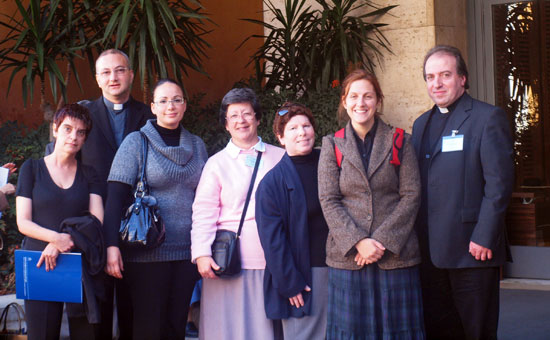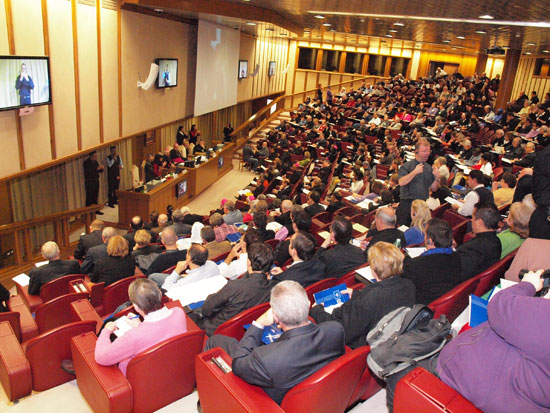A Maltese delegation including two Maltese deaf persons, a Maltese Sign Language Interpertor, two University lecturers and three priests, attended the XXIV International Conference organised by the Pontifical Council for Health Care Workers at the New Synod Hall in the Vatican from the 19th to 21st November 2009 on the theme: ‘Ephphatha! The Deaf Person in the Life of the Church’.
The aim of the conference was to offer the Church an opportunity to emphasize the contribution made by deaf persons in the different areas of the Church’s apostolate and also to give full recongnition to the importance of their work.
The conference interventions addressed principally the sociological, psychological, medical, familial and the pastoral realities of deaf persons. The issues treated by the speakers were supplemented by interesting experiences both from deaf persons and their families, as well as by dialogue with the conference participants. Amongst the keynote speakers was Fr. Cyril Axelrod, a blind and deaf priest who has been active in pastoral ministry with deaf and deafblind people in many parts of the world for many years.
Archbishop Zygmunt Zimowski, President of the Pontifical Council for Health Care Workers, said there are more than 278 million deaf people in the world, and at least 1.3 million of them are Catholic. “That is a lot and the church must act,” the Archbishop said. Without adequately prepared priests and other pastoral workers and trained sign language interpreters, he said, the church is making it difficult, if not impossible, for its deaf members to participate fully in parish life and liturgies, to learn about their faith and to contribute to the life of the church.
The participants also had a private audience with Pope Benedict XVI. In his address the Pope observed that the Church has historically been at the forefront of efforts to help the deaf, but he also recognized that more work needs to be done to ensure that deaf people feel fully accepted and incorporated in the church. He encouraged deaf persons not only to be eager to receive the message of the good news but also to proclaim it to others.
In her intervention during the conference, University Lecturer Dr Marie Alexander said that in Malta although much still needs to be done especially in the area of catechesis, every Saturday evening deaf people can attend a mass interpreted in Maltese Sign Language at the University Chapel, an initiative which is being supported by the Archdiocese of Malta. Moreover she said that sign language interpeter Maria Galea in consultation with Fr Martin Micallef and Fr Paul Sciberras, and two deaf researchers Dorianne Callus and Karl Borg are currently working on making the liturgy of the Mass available to the Maltese Deaf Community through Maltese Sign Lanugage (on DVD) and in print through the use of Valerie Sutton’s system of signwriting. All this work is taking place within the Maltese Sign Language Research Project under her (Dr Alexander) coordination and is currently being supported by the University of Malta. Last year, the translation of the Biblical Infancy narratives were recorded on DVD and written in signwriting by Maria Galea in consultation with Fr Paul Sciberras, Karl Borg and Dorianne Callus. She said she hoped the Archdiocese of Malta will soon have a team responsible for pastoral ministry with deaf people.
In its recommendations the Conference proposed amongst others that: the Church in every country should have an office which coordinates pastoral ministry with deaf people. Every diocese should have at least one priest competent in this field who can support deaf people to have full access to the sacraments, liturgy and catechesis. Moreover, there should be an awareness course for seminarians on pastoral work with deaf people and the possibility to learn sign language.






